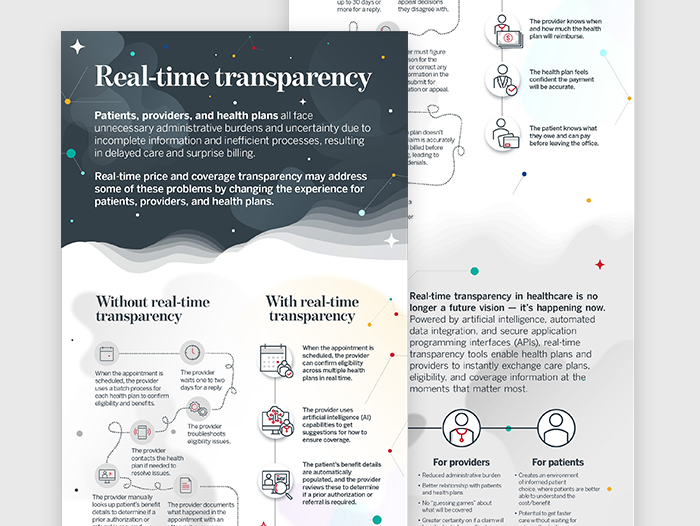Auto logout in seconds.
Continue LogoutAccording to a new report from Wolters Kluwer, more clinicians are utilizing generative AI, with many hoping it will help address staffing shortages, improve administrative efficiencies, and reduce burnout. However, many organizations are still not fully prepared to implement generative AI, and there continue to be several risks and concerns.
How clinicians are using generative AI
For the survey, Wolters Kluwer partnered with Ipsos to survey 312 healthcare professionals across the United States between Feb. 26 and March 24. The healthcare professionals were divided into six categories: nursing, pharmacy, administration, physician, allied health, and medical librarian.
Currently, around 42% of clinicians say they use generative AI routinely at work, once a week or more. There were also some variations among different healthcare professionals, with medical librarians using generative AI the most (53%) and allied health professionals using the technology the least (26%).
When asked about how they wanted to use generative AI to improve their organizations, most respondents said addressing staffing shortages (82%), generating administrative efficiencies (77%), and reducing burnout (76%).
"Every day, we see physicians struggling with workflow and the pressure to do more with less. This can be the straw that breaks the camel's back and results in exodus from the workforce," said Nisha Mehta, a radiologist and founder of Physician Side Gigs. "AI has been a welcome game changer for many early adopters who are seeking to grow and scale, both clinically and outside the exam room."
However, there continues to be a gap between what healthcare organizations want to achieve with generative AI and what they're currently capable of implementing — something the report says could be "a warning sign that [organizations] are more likely to focus on quick, immediate, small-scale wins instead of planning for a fully GenAI-enabled enterprise."
For example, although 80% of respondents said optimizing workflows within their departments was a top priority, only 63% said they were prepared to do so with generative AI. Similarly, 85% of nurses said it's crucial to recruit and retain nursing staff, but only 57% said they were ready to use generative AI to help recruit nursing talent.
"With such notable disconnects between wants and readiness, it will be important for leaders to find the places within the organization most likely to succeed with initial implementations that can be strategically expanded over time," the report said.
How to reduce risks and concerns with AI
Although the general sentiment about generative AI in healthcare seems to be positive, respondents also expressed several concerns, including an overreliance on AI leading to an erosion of clinical decision-making skills, data privacy and security, and bias in the generative AI training.
For more insights in AI and healthcare, check out these Advisory Board resources:
- This expert insight outlines different strategies for AI adoption, which can help you decide the best approach for your organization. Similarly, this expert insight explains how health system executives currently approach AI in healthcare.
- To use AI effectively, this infographic explains how to overcome AI challenges to unlock the technology's full potential while this field guide outlines how to take a problem-first approach to AI.
- We also have a featured page on AI, which includes research on how to mitigate challenges with the technology, how leaders should approach investments in AI tools, and more.
"Policies, procedures, and solid roadmaps will be essential for making GenAI a force for good in the healthcare community," the report said. However, only 18% of organizations have published policies on authorized uses for generative AI, and 20% require staff to follow formal training on the technology.
Among those who have published policies for generative AI, most have implemented data privacy rules (64%), transparency about how AI tools are trained (55%), and rules about the ethical implications of using generative AI (51%).
"As with any new technology being introduced in the healthcare setting, effective governance and change management are essential for the successful and safe adoption of Gen AI tools," said Holly Urban, VP of strategy, clinical effectiveness at Wolters Kluwer Health. "Healthcare organizations must establish robust methodologies for evaluating, selecting, implementing, and monitoring these tools."
"Given the vast array of Gen AI tools available and their associated risks, employing well-defined evaluation methodologies will ensure good organizational fit for Gen AI tools," Urban added. "These tools aren't set-it-and-forget-it due to the risks of overfitting and model drift, so ongoing monitoring is critical."
(Turner, Modern Healthcare, 6/3; Wolters Kluwer Generative AI: Balancing today's needs and tomorrow's vision, accessed 6/17)
Don't miss out on the latest Advisory Board insights
Create your free account to access 1 resource, including the latest research and webinars.
Want access without creating an account?
You have 1 free members-only resource remaining this month.
1 free members-only resources remaining
1 free members-only resources remaining
You've reached your limit of free insights
Become a member to access all of Advisory Board's resources, events, and experts
Never miss out on the latest innovative health care content tailored to you.
Benefits include:
You've reached your limit of free insights
Become a member to access all of Advisory Board's resources, events, and experts
Never miss out on the latest innovative health care content tailored to you.
Benefits include:
This content is available through your Curated Research partnership with Advisory Board. Click on ‘view this resource’ to read the full piece
Email ask@advisory.com to learn more
Click on ‘Become a Member’ to learn about the benefits of a Full-Access partnership with Advisory Board
Never miss out on the latest innovative health care content tailored to you.
Benefits Include:
This is for members only. Learn more.
Click on ‘Become a Member’ to learn about the benefits of a Full-Access partnership with Advisory Board
Never miss out on the latest innovative health care content tailored to you.


